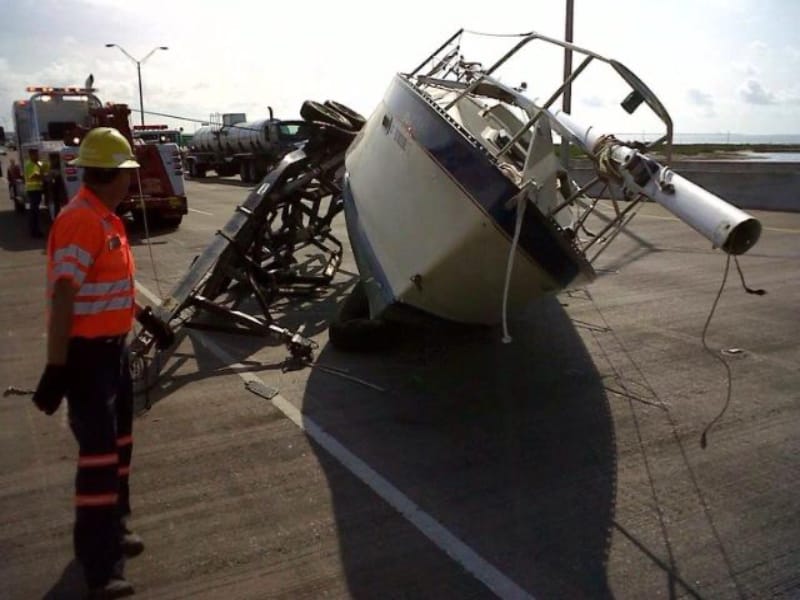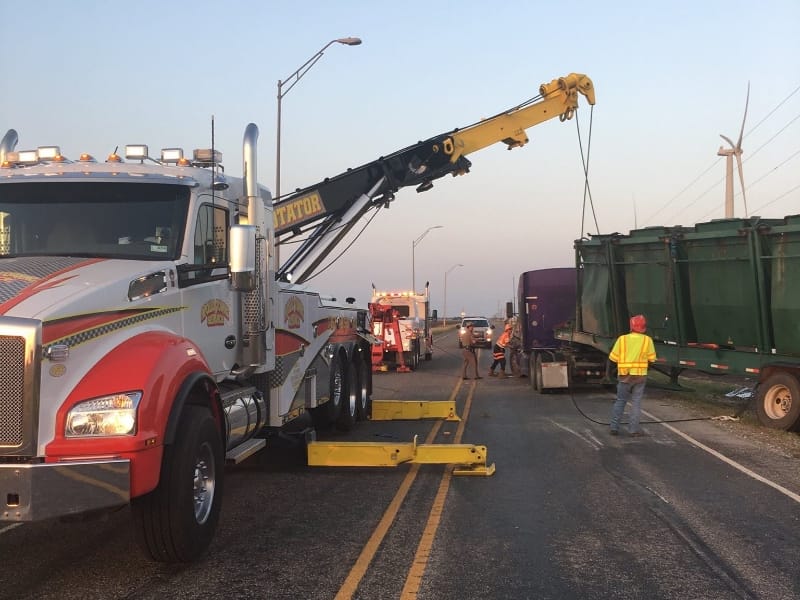Weight for It
We’ve handled enough Corpus Christi heavy recovery calls to know how easily towing can go wrong. Overloaded trailers, failed axles, and damaged transmissions all come down to the same issue: someone underestimated what their vehicle could handle. These aren’t rare situations. They happen every day because people skip the math.

Towing Capacity: What It Really Means
Towing capacity is the maximum weight a vehicle can pull without creating a hazard. Every part of the vehicle plays a role in that limit: engine, transmission, brakes, suspension, even the frame. Ignore the number, and you risk a mechanical failure that can put lives in danger.
The Numbers That Matter
To figure out how much you can tow safely, we look at several key figures:
- GVWR (Gross Vehicle Weight Rating): How much the vehicle can weigh when fully loaded.
- GCWR (Gross Combined Weight Rating): Total weight of your loaded vehicle and trailer combined.
- GAWR (Gross Axle Weight Rating): Maximum weight each axle can support.
- Curb Weight: The vehicle’s empty weight, including fluids but no passengers or cargo.
Start with the GCWR. Subtract the weight of your vehicle, passengers, and cargo. The remainder is your actual towing capacity.
If a truck has a GCWR of 15,000 lbs and it weighs 6,000 lbs with everything loaded inside, that leaves 9,000 lbs available for towing. Some people wrongly assume the full 15,000 is towable. That mistake has consequences.
What Goes Wrong in the Real World
Too many drivers guess based on feel or compare their load to someone else’s. Vehicles may have the horsepower to pull a trailer, but don’t have the frame strength or suspension support to keep it stable. Or the trailer is appropriate but overloaded it or packed it unevenly. These situations often end in jackknifes, crashes, or breakdowns.
Failures usually don’t happen on the first mile. The stress builds over time. Eventually, one part fails, and that’s when we get the call for Corpus Christi heavy recovery.
How We Recommend Towing
Numbers don’t lie. Every vehicle has limits. Look them up and run the calculations. Two identical trucks can have different towing setups depending on tires, axles, or hitches.
Check these before heading out:
- Manufacturer’s towing specs
- Cargo and passenger weight
- Correct class hitch and trailer
- Balanced trailer load
- Proper tongue weight
If the weight feels close to the edge, it’s time to stop and re-check. Cutting it close invites failure. Many of the recoveries we handle could’ve been prevented with a 10-minute check before the trip.
Towing Capacity FAQ for Smart Towing & Safety
1. How do I know my vehicle’s true towing capacity?
Look it up in the owner’s manual or manufacturer website. Don’t just rely on the advertised “max tow” number — that figure assumes an empty truck with no passengers or cargo. Real-world capacity is usually lower once you account for fuel, people, and gear.
2. What’s the difference between GVWR, GCWR, and payload?
- GVWR: Max total weight of your vehicle (truck + cargo + passengers).
- GCWR: Max combined weight of the loaded truck and the loaded trailer.
- Payload: How much weight you can put inside the truck bed or cab.
These figures work together — if you overload payload, you eat into your towing capacity.
3. Why does proper tongue weight matter?
Tongue weight (the downward force of the trailer on the hitch) affects steering and braking.
- Too light → trailer sway.
- Too heavy → overloaded rear axle and poor steering.
Aim for 10–15% of the total trailer weight on the tongue.
4. How can I avoid uneven trailer loading?
- Place heavier items low and centered over the axles.
- Keep side-to-side weight even.
- Secure everything so it doesn’t shift in transit.
Uneven loading is one of the most common triggers for jackknifes and Corpus Christi heavy duty recovery calls.
5. What should I check before every tow trip?
- Tire pressure on both vehicle and trailer
- Brake lights and trailer brakes
- Hitch rating vs. trailer weight
- Suspension sag or tilt
- Emergency breakaway cable and safety chains
A 5-minute pre-trip walk-around saves a lot of roadside trouble.
6. Does road type or terrain affect safe towing weight?
Yes. Grades, heat, rough roads, or long downhill stretches stress engines, brakes, and frames.
If your route includes mountain passes or rough terrain, stay well below your max rating.
7. What are the most common mistakes with towing capacity?
- Guessing at trailer weight instead of weighing it
- Ignoring cargo and passenger weight
- Using the wrong class hitch
- Skipping pre-trip checks
- Continuing after seeing sway, sag, or overheating
8. How can I spot early signs of towing stress before a breakdown?
Watch for:
- Rising transmission temperature
- Loss of braking power on hills
- Persistent trailer sway despite slowing down
- Strange noises near the axles or hitch
These are your cue to pull over and reassess.
9. What should I do immediately if my trailer starts to sway at highway speed?
Stay calm:
- Ease off the accelerator — don’t slam the brakes.
- Keep the steering wheel straight.
- Gently brake once speed drops.
- Move to a safe area and redistribute weight or check hitch/tongue.
10. Why trust Apollo Towing for heavy recovery in Corpus Christi?
Because we:
- Handle overturned semis, jackknifed rigs, and axle failures every week
- Use specialized gear and experienced operators to prevent secondary damage
- Respond 24/7 across the Coastal Bend region
- Offer not just recovery but guidance on safe towing practices

Apollo Towing: Corpus Christi Heavy Recovery Is What We Do
Our Corpus Christi heavy recovery team can pull semis off soft shoulders, uprighted toppled equipment trailers, and hauled away trucks that collapsed under the weight they were pulling. These jobs happen because someone skipped a step or trusted a gut feeling instead of hard numbers.
Our Corpus Christi heavy recovery crew is ready when things go wrong, but we also believe in helping people avoid the tow altogether. Every load should start with the right math and honest limits.
We don’t guess when it comes to Corpus Christi heavy recovery jobs. We assess, plan, and act with the right gear and experience. Every job reminds us that towing starts with knowing what your vehicle can handle—nothing more, nothing less.
If a haul’s on your schedule, check your numbers. If things go sideways, call the Corpus Christi heavy recovery team that knows how to get it back under control.

